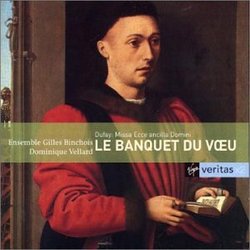| All Artists: Dufay, Ensemble Gilles Binchos, Vellard Title: Le Banquet Du Voeu Members Wishing: 0 Total Copies: 0 Label: Angel Records Release Date: 10/10/2000 Genres: Special Interest, Pop, Classical Styles: Vocal Pop, Opera & Classical Vocal, Chamber Music, Forms & Genres, Ballads, Historical Periods, Classical (c.1770-1830), Early Music Number of Discs: 2 SwapaCD Credits: 2 UPC: 724356181823 |
Search - Dufay, Ensemble Gilles Binchos, Vellard :: Le Banquet Du Voeu
 | Dufay, Ensemble Gilles Binchos, Vellard Le Banquet Du Voeu Genres: Special Interest, Pop, Classical
|
Larger Image |
CD Details |
CD ReviewsWonderful performances (and a lot of fun, too) hcf | 11/25/2000 (5 out of 5 stars) "CD 1The first disc in this set is an attempt to reconstruct an actual historical event: the Feast of the Pheasant which was held on February 17, 1454, as a prelude to a new crusade against the Turks. The event derives its name from the presence of an actual live pheasant to which the nobles about to embark on the crusade made their vows to recapture Constantinople (the booklet doesn't explain the connection between the Turks and the pheasant, and I have no idea). According to historical commentary, the event featured a lot of food and a lot of entertainment between the meals. Some of the musicians performed inside a huge pie sitting on one of the tables! (yes, folks, the idea of somebody jumping out of a cake is very old). All of the pieces here are short, presenting typical examples of medieval "formes fixes," i.e., relatively simple musical forms meant for popular entertainment. Most of the pieces combine voices and instruments, although some are performed a capella or only on instruments. The singers (most of whom also play the instruments) sing in unaffected voices, in a manner thought to be characteristic of the age. I personally like this manner of singing very much. I particularly enjoyed the contribution of soprano Anne-Marie Lablaude.CD 2Originally released in 1994, this recording of Dufay's Missa Ancilla Domine was one of the first recordings to combine the movements of the Mass Ordinary (Kyrie, Gloria, Credo, Sanctus and Agnus Dei) with the movements of the Mass Proper (Introitus, Graduale, Alleluja, Offertorium and Communio). Now the practice of placing the Ordinary in the context of liturgy is much more common (Paul McCreesh's recordings are a particularly fine example of this, although some conductors, such as Andrew Parrott, have been doing this since the 1980's). The performance here is all-male, with very fine and secure countertenor singing in the top lines. The tempi are slow, perhaps a bit too slow, but I didn't find that to be a detriment."
|

 Track Listings (21) - Disc #1
Track Listings (21) - Disc #1